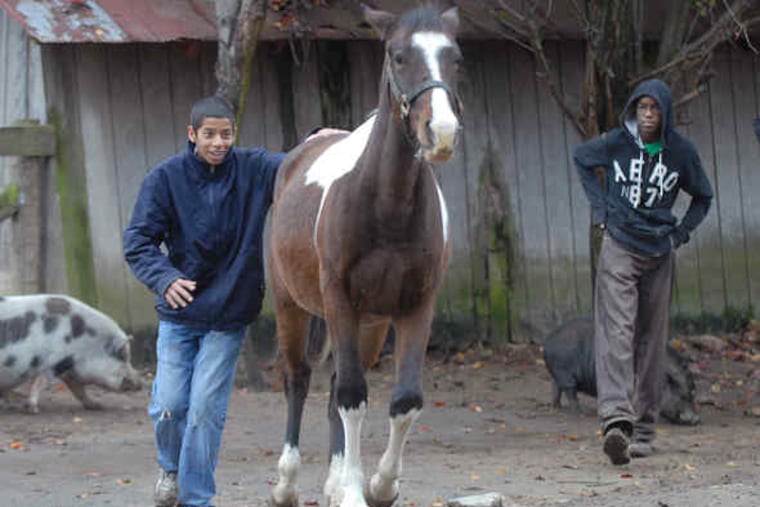Farm sanctuary helps those who need nourishing
Of all the animals that have come to Chenoa Manor, the geese were the worst off. Originally intended for the French delicacy foie gras, some of the birds were so obese that they couldn't walk, and none knew how to eat, as they had been force-fed their entire lives.

Of all the animals that have come to Chenoa Manor, the geese were the worst off.
Originally intended for the French delicacy foie gras, some of the birds were so obese that they couldn't walk, and none knew how to eat, as they had been force-fed their entire lives.
So Rob Teti, a Chester County veterinarian with a soft spot for all creatures in distress, put the geese in with his chickens, so they could watch and learn how to peck at food. Thankfully, they turned out to be quick studies.
For the past six years, Teti has been offering shelter to all sorts of troubled individuals at this last-resort sanctuary tucked behind a development of staid McMansions in Avondale, just west of Kennett Square. Here, on 25 acres of Andrew Wyeth-worthy pastures, streams and split-rail fences, an unlikely combination of visitors reaps the benefits of a safe space: rescued farm and exotic animals get room and board, and disadvantaged teens learn compassion and care during visits spent working with and studying the animals. Teti sees each as a group that's too often overlooked.
"There are so many similarities between the backgrounds of the animals that come to Chenoa Manor and the teens that come through here," says Teti. Some come from difficult or disadvantaged backgrounds. Most have, at some point, been misunderstood. All can benefit from nurturing and self-empowerment. "The teens flourish in an environment where they are allowed to be themselves," Teti adds, "and likewise with the animals."
For animals, what Teti offers is an option when all others fail. "The only prerequisite for them to come here is that they have no other place to go. There are many organizations helping cats and dogs but very few focusing on farm animals - it can be hard to elicit sympathy for a chicken, vs. a puppy."
That's why Teti, 36, who practices at VCA Glasgow Animal Hospital 30 minutes away in Delaware, bought this then-dilapidated farm for $300,000 back in 2000. He started to map out pastures for grazing cows and sheep, a pen for the rowdy pigs, a warren for the rabbits and a barnyard for the emus, llamas, turkeys and pygmy goats.
Then the animals began pouring in. There are now around 250, and caring for them isn't easy, as Teti has only volunteer help on which to rely. Still, he knows each animal by name: Delores and Julia, the rabbits that were raised for slaughter and then rescued when the abattoir went out of business; Balthasar, the former veal calf taken in after another animal sanctuary shut down; Eli, Ennis and Tina Louise, the pigs found nearly starved to death after a Maryland hog farm was shuttered; and Gladys the pig, a Hurricane Katrina victim found tied to a post on the front porch of a flooded house in New Orleans.
Now, Teti receives 15 to 20 calls and e-mails each week asking if he can accept additional animals. The only problem is he's operating at capacity until he can raise $200,000 to renovate and restore the property's historic 1813 bank barn, which he anticipates will eventually house more pigs, cows and horses.
But Teti, an outspoken vegan with a mop of unruly dark hair, loves to share more than shill, and his effervescent enthusiasm is matched only by a genuine, almost embarrassed humility. "I don't want this story to be about me," he said.
But he's the one getting up at dawn to feed the animals. And he's the one who funds between 65 percent and 75 percent of Chenoa Manor's $80,000 annual operating budget, which goes entirely to animal care.
A fund-raising event and art show held at the farm in mid-October raised just $5,900 toward that capital campaign - leaving a daunting $190,000 to go. Now, he needs more assistance than usual from a smattering of private donors and animal lovers who sometimes "adopt" residents, contributing anywhere from $20 a month to sponsor Taz, an emu, or $50 a month to care for Olivia, a Holstein cow.
The expansion of the bank barn will benefit not just the animals, but also children from programs like the Community Boys & Girls Club of Wilmington, whose members have participated in workshops crafting artistic treat-filled toys for animals or sketching them in their environments.
An entire floor of the structure will be devoted to an art studio and gallery for students to paint landscapes and animal portraits or to throw clay sourced from the property's own creek bed.
Students from Exton's School at Church Farm - a prep school for boys who might not otherwise be able to afford a private school education - who come out regularly to feed pigs, groom horses and de-worm goats, say Chenoa Manor has opened up a new world for them.
Christian Payne, 17, has been coming here for five years.
"Taking care of the animals and just being around them helps me calm down," he said.
Chad Pohlig, 17, from Upper Darby, had never set foot on a farm before he came here. "The first time I came was for required community service [for school], and I liked it so much I kept coming back. I love working with the animals."
Now, he's contemplating a career working with animals.